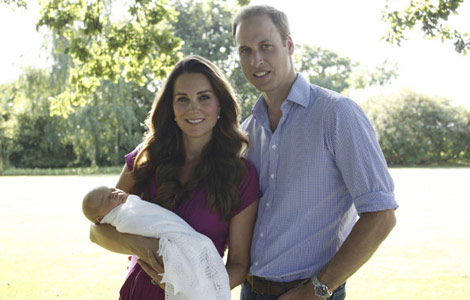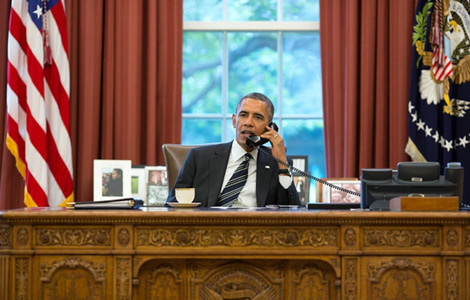US-Iran: Breakthrough after decades of silence
Updated: 2013-09-29 11:00
(Agencies)
|
||||||||
The US and Western allies imposed the penalties after years of Iran's stonewalling inspections and secrecy about its activities fueled fears about its intentions — especially as they relate to Israel. Iran insists its nuclear program is strictly for peaceful purposes.
House Majority Leader Eric Cantor, R-Va., criticized Obama for failing to pressure Rouhani on Iran's support for Islamic extremist groups and on human rights issues.
He said the US is fooling itself if it thinks that Rouhani, who took office in August after running on a more moderate platform, isn't beholden to Iran's supreme leader, Ayatollah Ali Khamenei, who controls matters of state, including the nuclear program.
For Obama, the call marked a realization of sorts of a stance he took in 2008, when he was first running for president and saying he would be willing to meet with leaders from nations such as Iran, Syria and North Korea without conditions. The policy earned him rebukes from critics who questioned what they derided as a Pollyanna approach to security threats.
The offer on the negotiating table for Rouhani would give Iran some relief from the economic penalties and pledge not to impose new ones. In exchange, Iran would end uranium enrichment that nears or reaches 20 percent, a level just a few steps from what's needed to produce fuel for an atomic weapon.
The deal, offered last February, would require suspended enrichment at Iran's fortified underground Fordo facility and increased access for U.N. inspectors.
"It's way too soon to presume either the prospect of an agreement on the nuclear program, which we hope to be able to achieve, but we're quite sober about the potential for that," Obama's national security adviser, Susan Rice, told CNN's "Fareed Zakaria GPS."
She added that "if we could have a peaceful resolution of the nuclear program and an end to Iran's support for terrorism and other behavior that has concerned us over many years, then we could begin a serious discussion about the future."
Obama said that the US will coordinate closely with its allies — including Israel, which considers a nuclear-armed Iran to be an existential threat.
Obama is set to meet with Israeli Prime Minister Benjamin Netanyahu at the White House on Monday.
- Obama: Role for diplomacy on Iran issue
- Iran confirms exchange of letters with Obama
- Iran forswears nuclear arms, says president
- Iran ready to allay West over nuclear program
- Rouhani presents a moderate Iran
- Iran signals willingness to resume nuclear talks
- Iran to resume nuclear talks with new negotiator
- Iran, US signal will to engage
- China eyes progress of Iran nuke issue solution
- Xi welcomes talks on Iran nuclear issue

 Kenya mourns victims of Westgate mall attack
Kenya mourns victims of Westgate mall attack
 Home schooling popular with Chinese parents
Home schooling popular with Chinese parents
 Royal Mint coins to mark Prince George christening
Royal Mint coins to mark Prince George christening
 29th Golden Rooster Awards
29th Golden Rooster Awards
 China marks birthday anniversary of Confucius
China marks birthday anniversary of Confucius
 Obama, Iran's Rouhani hold historic phone call
Obama, Iran's Rouhani hold historic phone call
 Li Na learns from her past
Li Na learns from her past
 Picture brightens for corporate profits
Picture brightens for corporate profits
Most Viewed
Editor's Picks

|

|

|

|

|

|
Today's Top News
China won't seek hegemony, FM tells UN
China on yellow alert as Typhoon Wutip nears
Xi to visit attend APEC summit
East China cities debut 4G phones
Shanghai FTZ begins operation
Deaths in Mumbai building collapse climb to 43
Mass rabies vaccinations called for
Obama, Rouhani hold phone call
US Weekly

|

|








